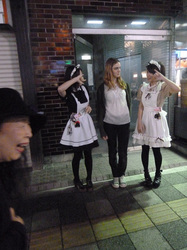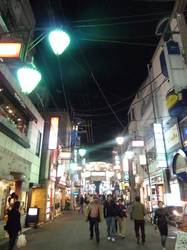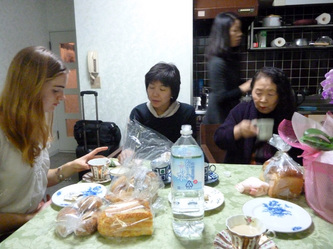At the door we were greeted by a willowy woman in a white smock who knelt and bowed with her head on the floor in a fluid motion. Then, without apparent effort, she rose and said "dozo" to show us into a tatami floored room, one of two rooms for customers in the house. It had a thick low table with heavy legs and odd-shaped chairs. "Dozo," everyone said, but how to sit? Mrs. Yokose demonstrated - you kneel on the edge of the chair then make a sudden twist and you're gracefully kneeling with your toes tucked under the back of the chair and your knees under the table.
We sampled some sake and began the evening with a round of kidding around and threats to make each other sing songs. The feeling was avuncular on the part of Mr. Yokose. Yayoi explained later that he was feeling bad because he had invited Camilla to stay for months, but now that his wife (who was sitting there beaming) possibly has terminal cancer, he thought he might wait to see what happens when she has her exploratory operation. So, this restaurant was, in part a way to get to know us, and in part, a way to apologize.
Our servers were the owner, a woman who'd grown up in the US and had a coarse accent I associate with urban poverty, a sharp contrast to her gracious Japanese manner. Her daughter, the willowy woman, also orchestrated the feast. They were cheerful, helpful, unobtrusive, but willing to join in the conversation if it was about food.
We started with sake, a flowery drink with a hint of rain and rice, that burned the throat. Next, three small bowls arrived at each place, one with liver paté, one with squid entrails in a creamy savory sauce, and one with fugu aspic. Fugu! Fugu! If it is prepared incorrectly, you die. This was the one place in Sendai authorized to prepare fugu, and lucky for us, it's fugu season. Each of the dishes had a light, delicate taste but completely different from the other two.
Next, fugu sashimi. They came in paper-thin slices on large green platters, along with a central pile of crisp skin slices, and around the edges, little piles of chives and big wedges of dai-dai, a green citrus fruit that translates as Seville orange.
You were suppoed to wrap the chives and skin with fugu meat, sprinkle it with dai-dai, and dip into a chive-sprinkled soy-based sauce. We all thought the taste reminded of something different. Camilla said rain, I said a dry field of grass (maybe I had too much skin in my fugu burrito), and Suzuki-san made a humorous haiku:
Fugu in autumn
I remember my o-ba (nurse)
my fictional life.
The servers said they'd never gotten such good feedback on the fugu.The next course was te-chiri, narrow white plates with fugu tempura, dusted lightly with chili powder. Fugu is delicate enough so that all these different ways of preparing it give completely different taste experiences, but you never feel as though it is being drowned out by the seasoning. I guess that's what gourmet dining is all about.
By this time the conversation was quite cheery and Camilla, with her dramatic appreciation of the dishes, had become the darling of the menfolk.
After velvety fugu soup, we were treated to a very rare sight. The owner, a stocky man with shaved head and white aikido sweats, made sushi at a display table through a window in the sliding doors. His two knives were heavy and sharp, one in a wooden sheath and the other in a cloth. He had a wooden box of cleaned fish on his left, and a large coarsly woven straw basket into which a round wooden box of rice fitted on his right.
He began by grating wasabi from a green horseradish root, and mixing the paste with some old paste. The fish cutting was logical and precise, no doubt with ritual movements. He soaked his cleanup cloth in ginger water, wiped his knives, and began. For a flatfish, he'd cut the tail off, open it out, cut the central veins out, then loosen the skin membrane and pull it off to get the fillets clean.
Finally, a fingertip of wasabi, a small log of rice, and careful shaping. He put a double row of six into a lacquered presentation box, and we were instructed to eat with our hands because it was too soft for chopsticks.
By this time, we were all patting our tummys (pom-pom), and saying pan-pan, the sound a drum makes, or a full stomach. We finished off with two kinds of soup and an apple persimmon dish for dessert.
Ahhh. Then abruptly, everyone stood up, bowed, thanked, bowed again, made protestations of admiration and undying friendship, and we were bundled into a taxi and sent to the train station.
We walked home from the station in a cool dark street, stopping in a brilliantly lit noisy convenience store for some teeny tofu wrapped ice cream balls.
In the middle of the night, someone fell against my face, and held it in both hands, staring. Then, with an agitated voice, she turned to Yayoi's futon, shook her awake, and began speaking, then weeping. "Oh no," I thought, "It must be very bad news indeed." But it wasn't. The lady was stinking drunk, and had mistaken our room for her own, five floors above.
From now on, we lock the door.



 RSS Feed
RSS Feed
